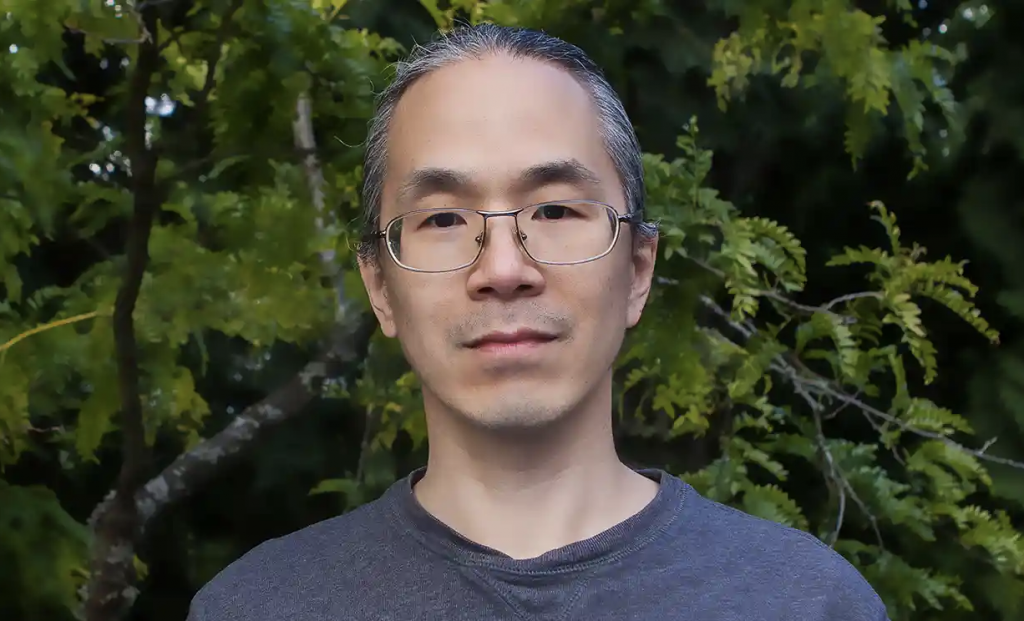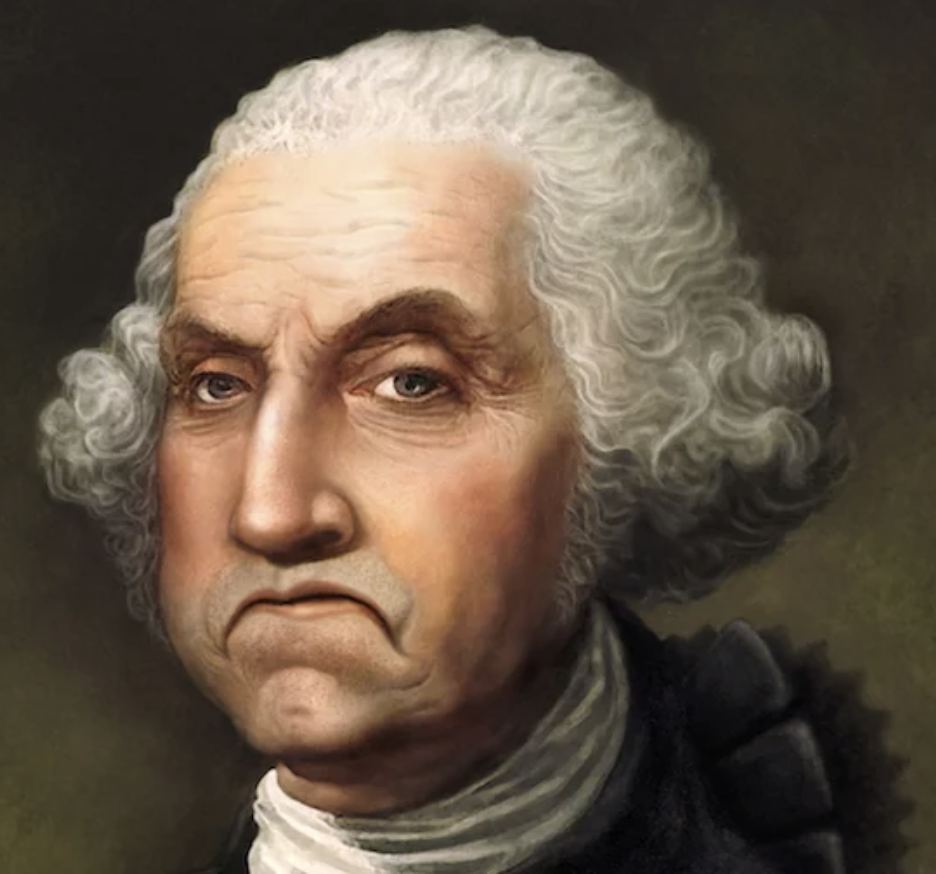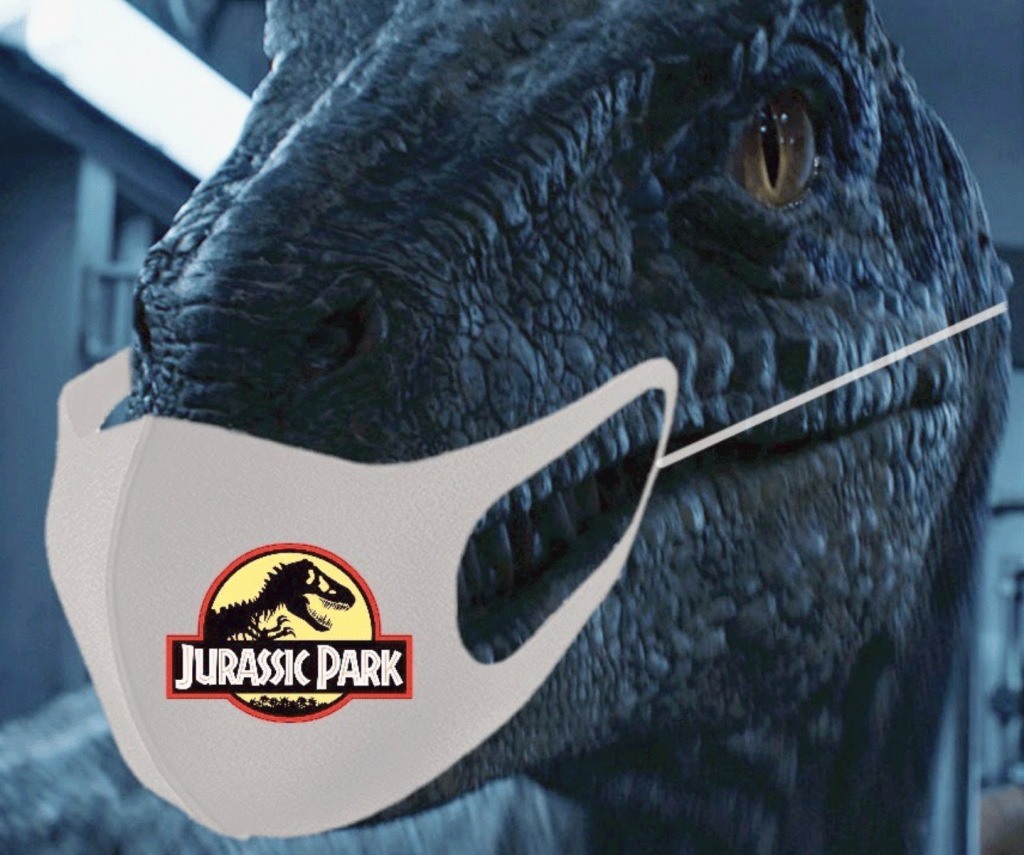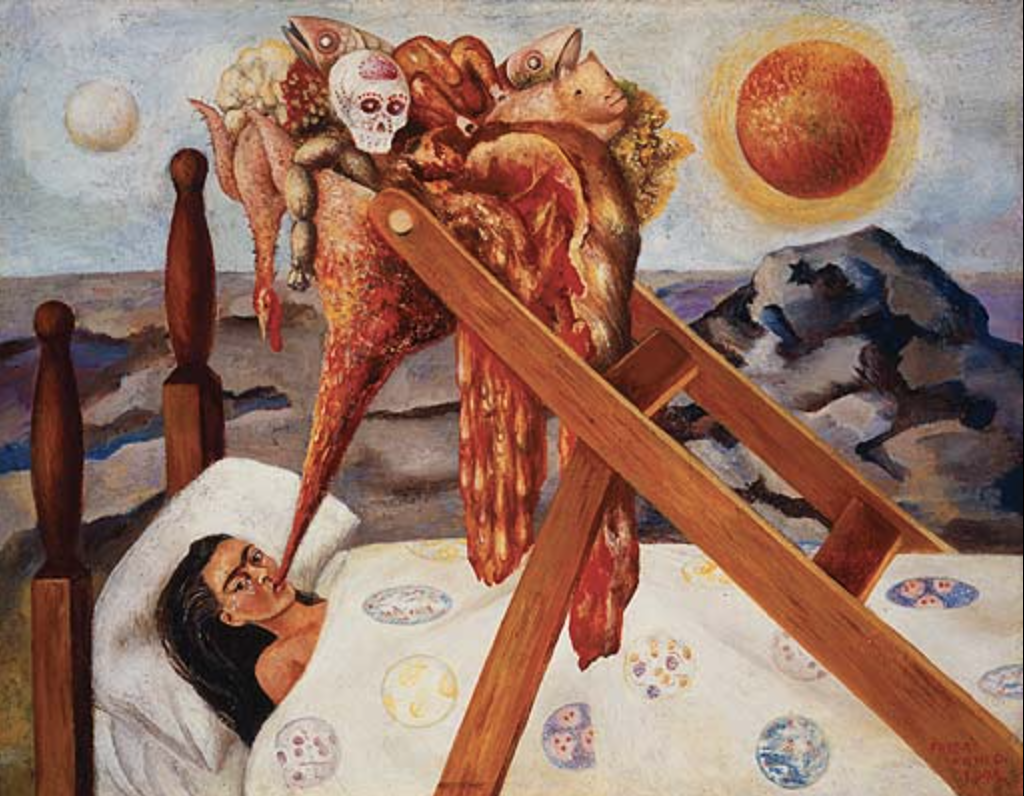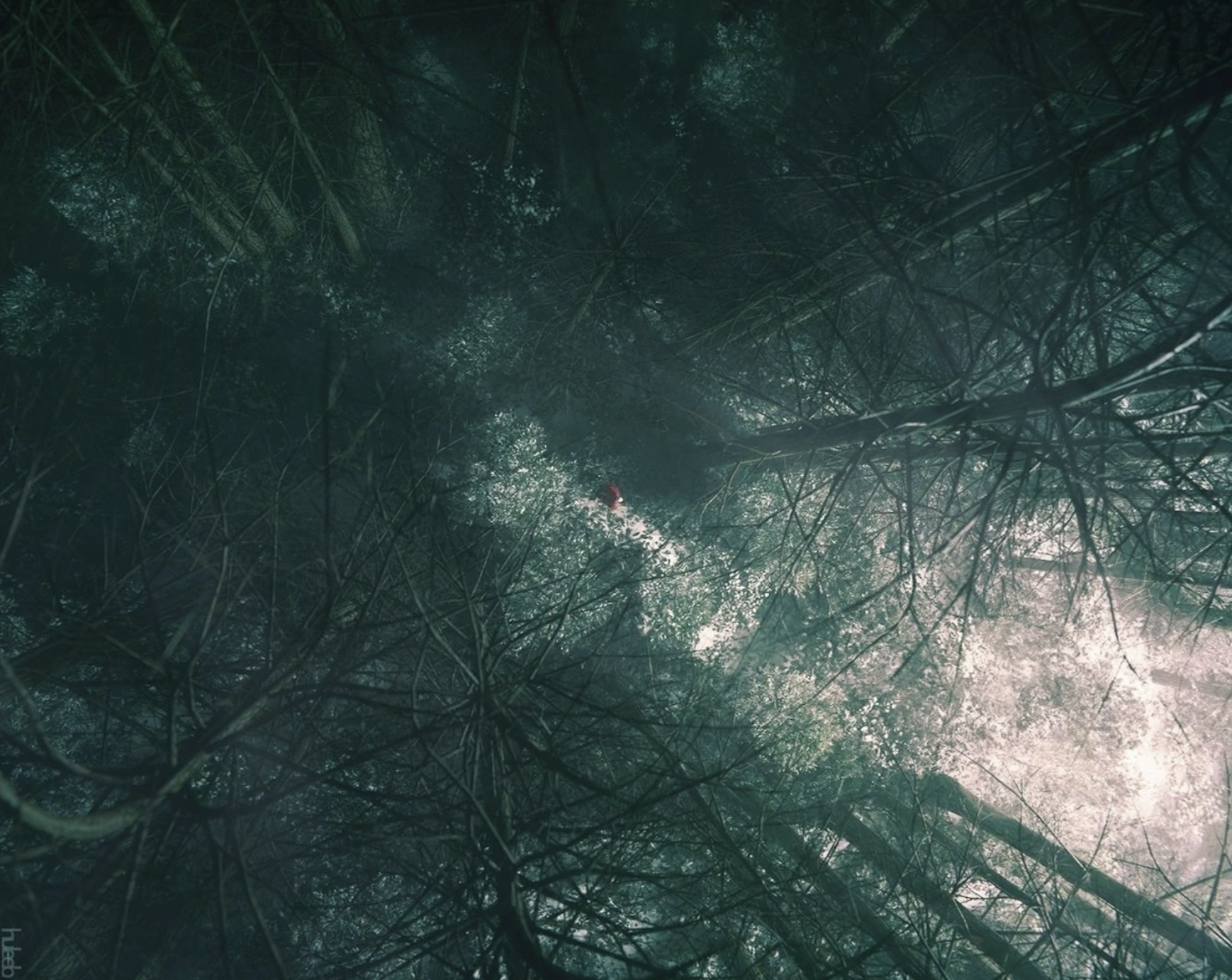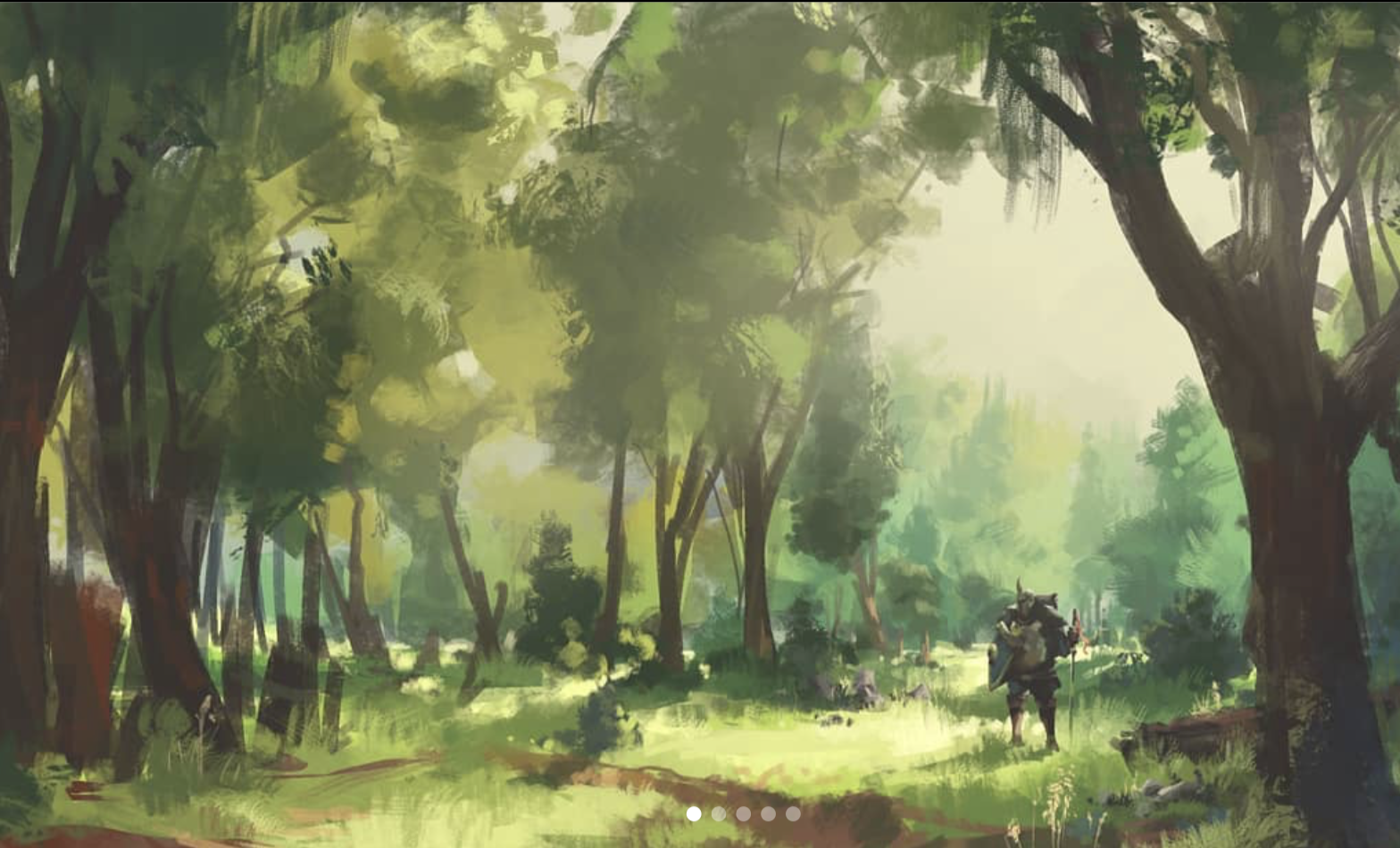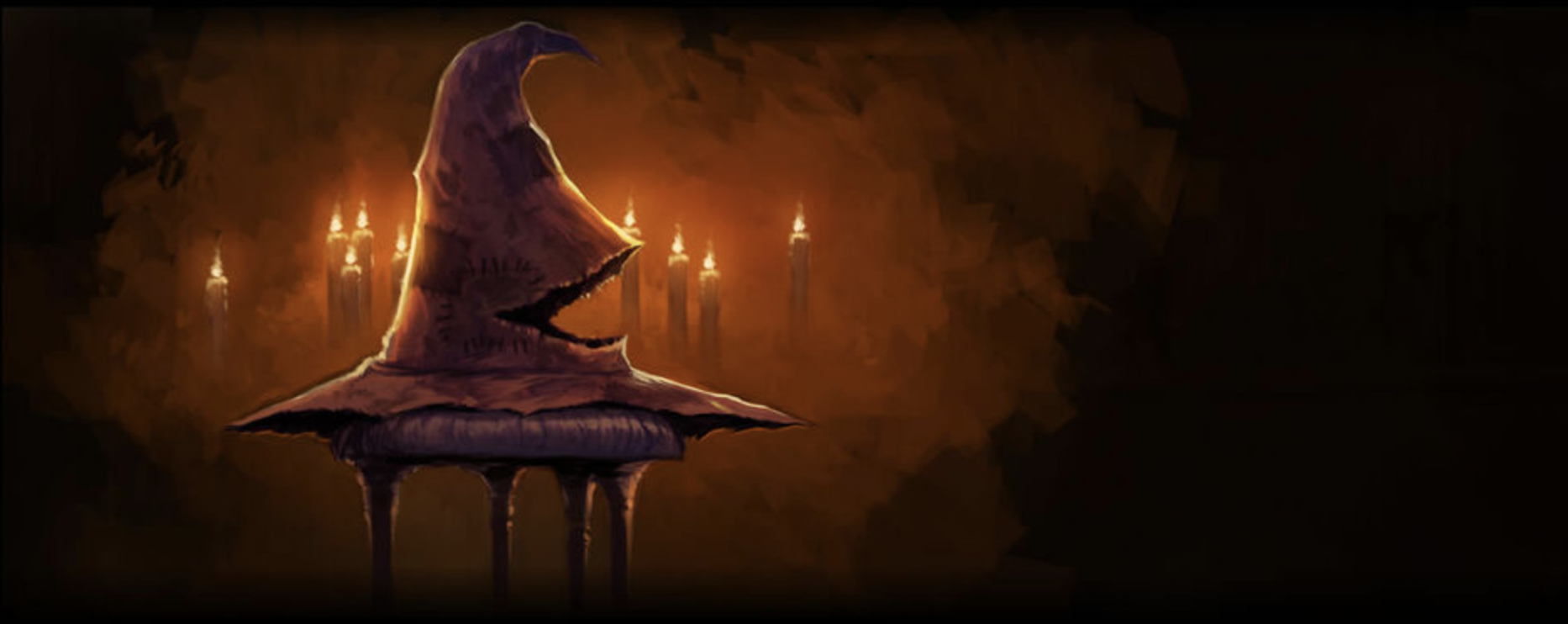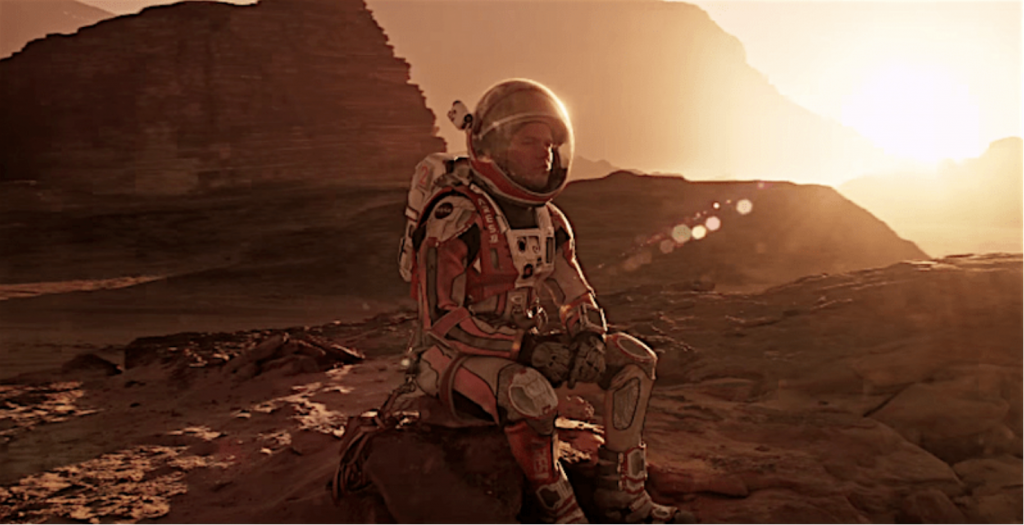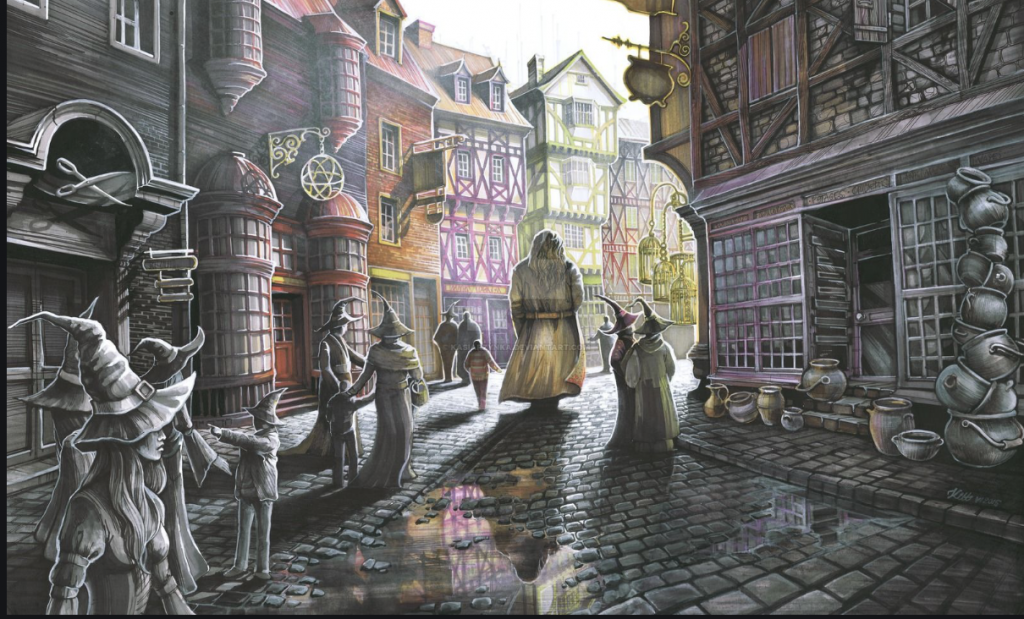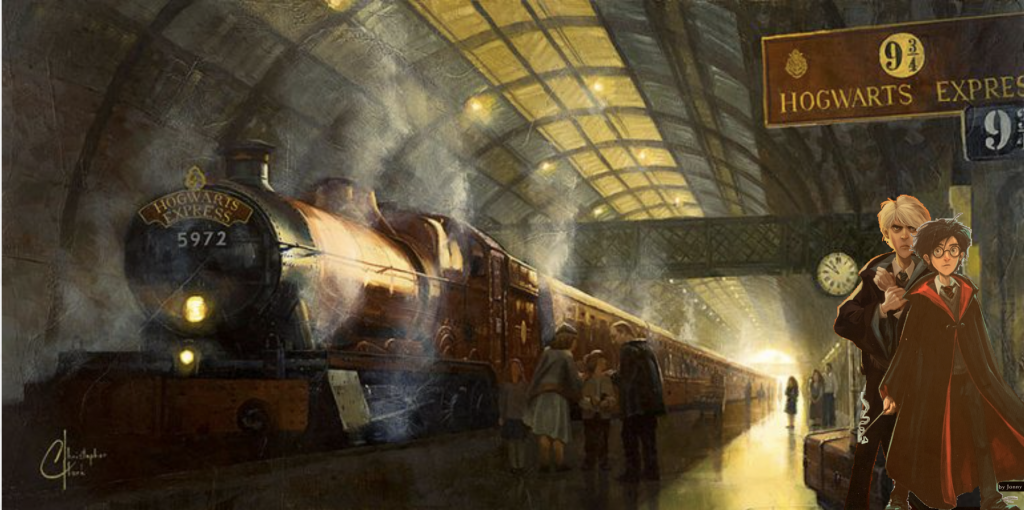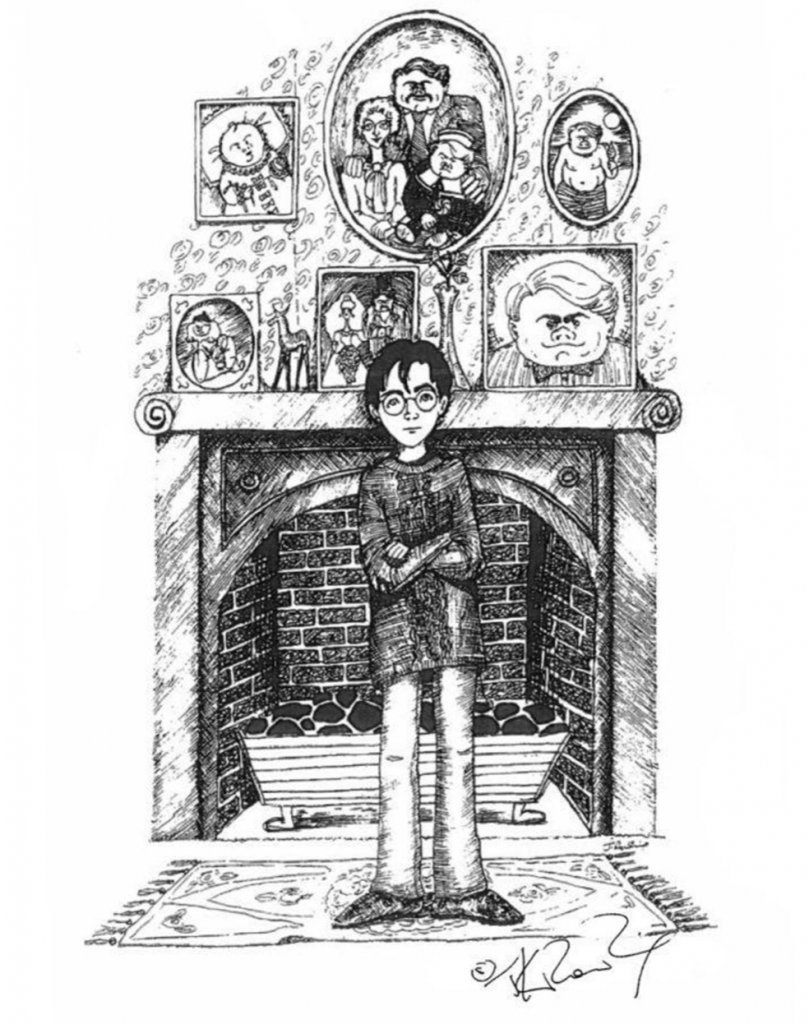Sorted-Into-Slytherin-1
The door swung open at once. A tall, black-haired witch in emerald-green robes stood there. She had a very stern face and Harry’s first thought was that this was not someone to mess with.
“The firs’-years, Professor McGonagall,” said Hagrid.
“Thank you, Hagrid. I will take them from here.”
She pulled the door wide. The Entrance Hall was so big you could have fitted the whole of the Dursley’s house in it. The stone walls were lit with flaming torches like the ones at Gringotts, the ceiling was too high to make out, and a magnificent marble staircase facing them led to the upper floors.
They followed Professor McGonagall across the flagged stone floor. Harry could hear the drone of hundreds of voices from a doorway to the right – the rest of the school must already be here – but Professor McGonagall showed the first years into a small empty chamber off the hall. They crowded in, standing rather closer together than they would usually have done, peering about nervously.
“Welcome to Hogwarts,” said Professor McGonagall. “The start-of-term banquet will begin shortly, but before you take your seats in the Great Hall, you will be sorted into your houses. The Sorting is a very important ceremony because, while you are here, your house will be something like your family within Hogwarts. You will have classes with the rest of your house, sleep in your house dormitory and spend free time in your house common room.
“The four houses are called Gryffindor, Hufflepuff, Ravenclaw, and Slytherin. Each house has its own noble history and each has produced outstanding witches and wizards. While you are at Hogwarts, your triumphs will earn your house points, while any rule-breaking will lose house points. At the end of the year, the house with the most points is awarded the House Cup, a great honor. I hope each of you will be credit to whichever house becomes yours.”
“The Sorting Ceremony will take place in a few minutes in front of the rest of the school. I suggest you all smarten yourself up as much as you can while you are waiting.” Harry saw Draco slick his blond hair back with his hand. Vincent’s cloak was wrinkled and fastened under his right ear while Gregory’s cloak was covered in chocolate stains. Harry nervously tried to flatten his hair.
“I shall return when we are ready for you,” said Professor McGonagall. “Please wait quietly.”
As she left the chamber, Draco whispered, “Another Muggle-lover, I bet. Talks like she’s got a unicorn horn up her-” Vincent and Gregory chuckled loudly before Harry could hear the punch line. He didn’t like that Draco was insulting their new teacher, who seemed severe but also just. Harry swallowed.
“So you said there’s an old hat that they use for the sorting? How?”
“It’s some sort of test.”
Harry’s heart gave a horrible jolt. A test? In front of the whole school? But he didn’t know any magic yet – what on earth would he have to do? He hadn’t expected something like this the moment they arrived. He looked around anxiously and saw that everyone else looked terrified too. He saw the girl, Hermione, standing next to the tall, gangly, red-headed boy and talking animatedly. The red-headed boy nodded and smiled, but then frowned and looked like he was about to puke. Harry tried to listen, and he heard snippets of Hermione whispering about all the spells she’d learnt and wondering which one she’d need. Harry stopped listening. He’d never been more nervous, never not even when he’d had to take a school report home to the Dursleys saying that he’d somehow turned his teacher’s chalk into a garden snake. He kept his eyes fixed on the door. Any second now, Professor McGonagall would come back and lead him to his doom.
Then something happened which made him jump about a foot in the air – several people behind him screamed.
“What the – ?”
He gasped. So did the people around him. About twenty ghosts had just streamed through the back wall. Pearly-white and slightly transparent, they glided across the room talking to each other and hardly glancing at the first-years. They seemed to be arguing. What looked like a fat little monk was saying, ‘Forgive and forget, I say, we ought to give him a second chance-”
“My dear Friar, haven’t we given Peeves all the chances he deserves? He gives us all a bad name and you know, he’s not really a ghost – I say, what are you all doing here?”
A ghost wearing a ruff and tights had suddenly noticed the first-years.
Nobody answered.
“New students!” said the Fat Friar, smiling around at them. “About to be sorted, I suppose?”
A few people nodded mutely.
“Hope to see you in Hufflepuff!” said the Friar. “My old house, you know.”
“Move along now,” said a sharp voice. “The Sorting Ceremony’s about to start.”
Professor McGonagall had returned. One by one, the ghosts floated away through the opposite wall.
“Now, form a line,” Professor McGonagall told the first-years, “and follow me.”
Feeling oddly as though his legs had turned to lead, Harry got behind Vincent and Draco and they walked out of the chamber, back across the hall and through a pair of double doors into the Great Hall.
Harry had never even imagined such a strange and splendid place. It was lit by thousands and thousands of candles which were floating in mid-air over four long tables, where the rest of the students were sitting. These tables were laid with glittering golden plates and goblets. At the top of the Hall was another long table where the teachers were sitting. Professor McGonagall led the first-years up here, so that they came to a halt in a line facing the other students, with the teachers behind them. The hundreds of faces staring at them looked like pale lanterns in the flickering candlelight. Dotted here and there among the students, the ghosts shone misty silver. Mainly to avoid all the staring eyes, Harry looked upwards and saw a velvety black ceiling dotted with stars. He heard Draco whisper to Vincent, “It’s not actually the sky, you stupid troll spawn, it’s only bewitched to look like that.”
It was hard to believe there was a ceiling there at all, and that the Great Hall didn’t simply open on to the heavens. Harry whispered to Vincent, “I thought it was the real sky too,” and Malfoy smirked.
Harry quickly looked down again as Professor McGonagall silently placed a four-legged stool in front of the first-years. On top of the stool she put a pointed wizard’s hat. This hat was patched and frayed and extremely dirty. Aunt Petunia wouldn’t have let it in the house.
Maybe they had to try and get a rabbit out of it, Harry thought wildly, that seemed the sort of thing – noticing that everyone in the Hall was now staring at the hat, he stared at it too. For a few seconds, there was completely silence. Then the hat twitched. A rip near the brim opened wide like a mouth – and the hat began to sing.
Oh I may not be the cleanest hat
Or the most good-looking wizard’s cap
But when I’m on top of your head to sit
You will understand my exceptional wit!
Keep your boaters and chic berets
Especially fedoras, keep those away
For I’m the Sorting Hat of this wizarding school
And I have never been anyone’s fool!
There’s nothing hidden in your mind
The Sorting Hat cannot know or find
So try me on and I’ll announce
Where you should be, your Hogwart’s house!
You might belong in Slytherin
The house for those with ambition
[Draco nudged Harry, nodded, and smiled.]
Enduring all struggles to achieve their ends
If you’re cunning and ruthless, these are your friends!
[“I know you’ll get in, Harry,” said Draco. Harry felt nervous. Draco put his hand affectionately on Harry’s shoulder, felt Draco’s hand shaking, and for the first time Harry thought Draco wasn’t that bad.]
Or you might belong in Hufflepuff
Who shine the brightest when the going gets tough
They are loyal and patient, just and true
If you’re quiet and kind, this House’s for you!
Or maybe you’ll be in Ravenclaw
If your reasoning mind’s without a flaw
For those of wit and who love to learn
Choose this house when it’s your turn!
And last we come to Gryffindor
The brave of heart who…[Draco said something to Harry which he couldn’t hear, and which distracted him]…explore
Their daring and…Harry whispered, “Be quiet Draco!”
…the house to choose!
So put me on! Don’t be scared.
I promise you, you are prepared.
You’re safe with me, even though I can’t move.
I’m a Thinking Hat! With nothing to prove!
The whole Hall burst into applause as the hat finished its song. It bowed to each of the four tables and then became quite still again.
“So my father was right,” said Draco. “We’ve just got to go and try on the hat. This’ll be a piece of cauldron cake.”
Harry smiled weakly. Yes, trying on the hat was a lot better than having to do a spell, but he did wish they could have tried it on without everyone watching. The hat seemed to be asking rather a lot; Harry didn’t feel ambitious or patient or witty or any of it at the moment. If only the hat had mentioned a house for people who felt a bit queasy, that would have been the one for him.
Professor McGonagall now stepped forward holding a long roll of parchment.
“When I call your name, you will put on the hat and sit on the stool to be sorted,” she said. “Abbott, Hannah!”
A pink-faced girl with blonde pigtails stumbled out of line, put on the hat, which fell right down over her eyes, and sat down. A moment’s pause –
“HUFFLEPUFF!” shouted the hat.
The table on the right cheered and clapped as Hannah went to sit down at the Hufflepuff table. Harry saw the ghost of the Fat Friar waving merrily at her.
“Bones, Susan!”
“Hufflepuff!” shouted the hat again, and Susan scuttled off to sit next to Hannah. Harry thought maybe he’d like to join Hufflepuff, since it seemed to be the most popular house so far and the girls who were chosen looked pretty nice.
“Boot, Terry!”
“RAVENCLAW!”
The table second from the left clapped this time, several Ravenclaws stood up to shake hands with Terry as he joined them. “Brocklehurst, Mandy” went to Ravenclaw then “Bulstrode, Millicent,” went to Slytherin. Perhaps it was Harry’s nervous imagination, but the Slytherin table didn’t look very pleasant. But didn’t Draco say it was the best house?
“Crabbe, Vincent.” Next to Harry, Vincent didn’t move. Everyone started to look around. Professor McGonagall coughed into her hand.
“Crabbe, Vincent,” the hat repeated. Harry gently prodded Vincent, saying, “That’s you.”
“Oh, um, yeah.” Crabbe lumbered to the sorting hat.
“SLYTHERIN.” Crabbe went to the Slytherin table and gave Harry a trembling thumbs up.
Harry was starting to feel definitely sick now. He remembered being picked for teams during sports lessons at his old school. He had always been last to be chosen, not because he was no good, but because no one wanted Dudley to think they liked him.
“Goyle, Gregory!”
Sometimes, Harry noticed, the hat shouted out the house at once (as it did for Vincent), but at others it took a little while to decide. Gregory sat on the stool for almost a whole minute before the hat declared him a Slytherin.
“Granger, Hermione!”
Hermione almost ran to the stool and jammed the hat eagerly on her head.
“GRYFFINDOR!” shouted the hat. Harry felt a twisting sensation in his stomach.
A horrible thought struck Harry, as horrible thoughts always do when you’re very nervous. What if he wasn’t chosen at all? What if he just sat there with the hat over his eyes for ages, until Professor McGonagall jerked it off his head and said there had obviously been a mistake and he’d better get back on the train? Harry didn’t care which house he was in, as long as he could stay here. Harry lost track of time until he heard,
“Malfoy, Draco!” Malfoy swaggered forward and got his wish at once: the hat had barely touched his head when it screamed, “SLYTHERIN!” Malfoy went to join Crabbe and Goyle, looking pleased with himself, then he stared at Harry, mouthing the words, “You can do it.”
There weren’t many people left now.
“Moon’…Nott…Parkinson….then a pair of twin girls, Patil and Patil…then ‘Perks, Sally-Anne, and then, at last –
“Potter, Harry!”
As Harry stepped forward, whispers suddenly broke out like little hissing fires all over the hall.
“Potter, did she say?”
“The Harry Potter?”
The last thing Harry saw before the hat dropped over his eyes was the hall full of people craning to get a good look at him. Next second he was looking at the black inside of the hat. He waited.
“Hmmm, said a small voice in his ear. “Difficult. Very difficult. Plenty of courage, I see. Not a bad mind, either. There’s talent, oh my goodness, yes – and a nice thirst to prove yourself, a burning ambition, now that’s interesting … So where shall I put you?” Harry gripped the edges of the stool and remembered the train ride, Draco saying, And how we can get into Slytherin, then he remembered the Salazar Slytherin Chocolate Frog card, lucky you! He’s rare. It must be a sign. You’ll definitely be in Slytherin house. Harry then imagined the Slytherin table, and Malfoy being annoying, and Hagrid saying all of Voldemort’s followers were in Slytherin…
“Uncertain about Slytherin, eh?” said the small voice.
“Yeah,” Harry thought, “I don’t know which house to…to…”
“You could be great, you know, it’s all here in your head, and Slytherin will help you on the way to greatness, no doubt about that.”
“Really?” Harry didn’t know much else about any of the other houses, and his three friends from the train had already gone to Slytherin. Harry remembered Draco putting his hand on his shoulder and Vincent giving him the trembling thumbs up. He remembered all the advice Malfoy gave him on the train, and him saying, I’ll know you’ll get in…
“Oh, and what do we have here, you’re a parseltongue!”
“A what?”
“You can talk to snakes?”
“I can?”
“Yes, you can, hmmm, very interesting, very interesting indeed…” Harry remembered talking to the snake at the zoo on Dudley’s birthday. He thought that had been his imagination. “You know,” said the hat, “Salazar Slytherin was a parseltongue too.”
“Yeah, I read that on his Chocolate Frog card.”
“Very powerful wizards have been in Slytherin house…wizards who have changed the world. And you happen to have many qualities that Salazar prized in his hand-picked students: resourcefulness, determination, a certain disregard for rules. So what’s it going to be?” Harry furrowed his brow and tried to reflect. He must have been sitting on the stool for over two minutes.
“Er – maybe, Slytherin, I guess, but-”
“SLYTHERIN!”
Harry heard the hat shout the last word to the whole Hall. He took off the hat and walked shakily towards the Slytherin table. He was so relieved to have been chosen to be in a house at all, he hardly noticed that beyond the gruff shouts and hoots of congratulations from the Slytherin table, the rest of the Hall was deathly silent. The other tables stared in what seemed like a terrified awe, and it seemed to Harry that some of the other students were frightened of him. “We got Potter! We got Potter!” shouted Draco as he menacingly gestured his fist towards the other houses. Harry sat down opposite a ghost with blank staring eyes, a gaunt face, and robes stained with silver blood. “Meet the Bloody Baron, Harry,” said Draco.
“Hi – er – Bloody Baron,” the ghost replied with a guttural, “aarrhhhggg.”
He could see the High Table properly now. At the end farthest away from him sat Hagrid, who caught his eye and looked at him with a curious frown. And there, in the center of the High Table, in a large gold chair, sat Albus Dumbledore. Harry recognized him at once from one of Draco’s Chocolate Frog cards on the train. Dumbledore’s silver hair was the only thing in the whole Hall that shone as brightly as the ghosts. He was also looking at Harry with a curious frown. Harry spotted Professor Quirrel, too, the nervous young man from the Leaky Cauldron. He was looking very peculiar in a large purple turban, and he smiled at Harry in a bizarre, almost frenzied-like way.
And now there were only three people left to be sorted. ‘Turpin, Lisa became a Ravenclaw and then it was the boy from the train, Ron’s turn. After Ron was sorted into Gryffindor the last name was called,
“Zabini, Blaise,” a haughty looking boy with high cheekbones and long, slanting eyes approached the hat. Draco whispered to Harry, “His mom’s famous.”
“Really?”
“Yeah, wickedly beautiful and filthy rich too, some kind of witch model. She’s been married five times and each of her husbands died mysteriously, leaving her mounds of gold.”
“Oh…”
“He’d be a good person to know if-”
“SLYTHERIN!” The Slytherin table cheered and Draco elbowed Harry and winked. “Sit next to us Blaise!” Professor McGonagall rolled up her scroll and took the Sorting Hat away.
Harry looked down at his empty gold plate. He had only just realized how hungry he was. The pumpkin pasties seemed ages ago.
Albus Dumbledore had got to his feet. He was beaming at the students, his arms opened wide, as if nothing could have pleased him more than to see them all here.
“Welcome!” he said, “Welcome to a new year at Hogwarts! Before we begin our banquet, I would like to say a few words. And here they are: Tweak! Oddment! Blubber! Nitwit!”
“Thank you!”
He sat back down. All the tables except Slytherin’s table clapped and cheered. Harry didn’t know whether to laugh or not, and started to clap, but Draco stopped him.
“Is he – a bit mad?” asked Harry.
“Mad?” said Draco accusingly. “He’s completely insane. My father thinks he’s the worst thing that ever happened to this place. But we’ll talk about him later, he’s probably listening. Slow down Goyle you’re going to choke on something.”
Harry’s mouth fell open. The dishes in front of him were now piled with food. He had never seen so many things he liked to eat on one table: filet mignon, buttered lobster, spicy buffalo chicken wings, Mikey special pizza slices, garlic break sticks, coconut fried shrimp, buttermilk pancakes, pure maple syrup, pineapple fried rice, juicy hamburgers, bottles of siracha, and, for some strange reason, a black and green can of Monster’s energy drink.
The Dursleys had never exactly starved Harry, but he’d never been allowed to eat as much as he liked. Dudley had always taken anything that Harry really wanted, even if it made him sick. Harry piled his plate with a bit of everything except the vegetables and began to eat. It was all delicious.
“Stuff ya soft face ya greedy pig,” said the Bloody Baron, watching Harry rip the meat off a chicken wing.
“Can’t you-”
“I haven’t eaten for nearly six hundred years,” said the ghost. “Don’t need to, of course, makes me sick watching you all gorge yourselves.”
“Then why don’t you leave?” asked Malfoy. “Nobody’s stopping you. Float away.”
“We ghosts gotta be here,” leered the baron. Harry stared at his blood-soaked robes.
“How’d your robes get all bloody?” The baron let out a wheezing, raspy chuckle.
“That story’s for anudder day. Too violent for kids like yourselves.”
When everyone had eaten as much as they could, the remains of the food faded from the plates, leaving them sparkling clean as before. A moment later the deserts appeared. Strawberry cheesecake, cookie dough ice cream, chocolate lava cakes, peanut butter pies, chocolate chip cookies, caramel creams…
As Harry helped himself to a chocolate lava cake, mixing the piping-hot chocolate sauce with french vanilla ice cream, the talk turned to their families.
“I’m pure blood back two hundred years,” said Draco. “I think there’s a crazy aunt who married a Muggle two hundred years ago, but we burned her off the family tree.”
“Never met my dad,” said Blaise, but based on what I know about him, I think he might have been a Muggle…” The table went awkwardly silent.
“Anyway…” said Malfoy while widening his eyes, shaking his head, and glancing at everyone knowingly except Blaise, “There aren’t many 100% pure blood families left.”
“My family’s pure back one-hundred years,” said Millicent.
“Not bad Milly,” said Draco, “Not too bad.” She blushed and looked down.
“You think classes gonna be difficult?” asked Vincent. “My dad says I’ll probably fail out. I’m worried.” Harry put his arm around Vincent’s shoulder. “I’m worried too, Vincent. We’ll help each other.”
“Well all I care about is learning the dark arts. Most of the other courses, charms, transfiguration, care of magical creatures, are a big waste of time.”
Harry, who was starting to feel warm and sleepy, looked up at the High Table again. Hagrid was drinking deeply from his goblet and listening to Dumbledore, who was whispering in his ear and glancing at Harry. Professor McGonagall seemed to also be listening and looking in Harry’s direction. Professor Quirrell, in his absurd turban, was talking to a teacher with greasy black hair, a hooked nose and sallow skin.
It happened very suddenly. The hook-nosed teacher looked past Quirrell’s turban straight into Harry’s eyes – and a sharp, hot pain shot across the scar on Harry’s forehead.
“Ouch!” Harry clapped a hand to his head.
“Shut up Harry,” said Draco, “I was telling a story. So I was flying around my manor on my uncle’s broom when-”
The pain had gone as quickly as it had come. Harder to shake off was the feeling Harry had got from the teacher’s look – a feeling that he didn’t like Harry at all.
“Who’s that teacher talking to Professor Quirrell,” he asked the Slytherin prefect named Walter.
“Oh, you know Quirrell already, do you? No wonder he’s looking so nervous, that’s Professor Snape. He teaches Potions, but he doesn’t want to – everyone knows he’s after Quirrell’s job. Knows an awful lot about the Dark Arts, Snape.”
“My dad knows him, Harry,” Draco interrupted his story. “I’ll tell you everything I know about him later.”
“Thanks.” Harry watched Snape for a while but Snape didn’t look at him again.
At last, the deserts disappeared and Professor Dumbledoor got to his feet again. The Hall fell silent.
“Ahem – just a few more words now we are all fed and watered. I have a few start-of-term notices to give you.
“First-years should note that the forest in the grounds is forbidden to all pupils. And a few of our older students would do well to remember that as well.”
Dumbledore’s twinkling eyes flashed in the direction of a red-headed twins seated at the Gryffindor table.
“I have also been asked by Mr. Filch, the caretaker, to remind you all that no magic should be used between classes in the corridors.
“Quidditch trials will be held in the second week of term. Anyone interested in playing for their house teams should contact Madam Hooch.”
“I’m definitely trying out,” whispered Draco.
“You can’t,” said Walter, “first-years aren’t allowed.”
“What? No way. That’s no fair. What if-”
“Shhh!”
“And finally,” Dumbledoor continued, “I must tell you that this year, the third-floor corridor on the right-hand side is out of bounds to everyone who does not wish to die a very painful death.
Harry laughed, but he was one of the few who did.
“He’s not serious?” he muttered to Walter.
“Must be,” said Walter, frowning at Dumbledoor. “It’s odd, because he usually gives us a reason why we’re not allowed to go somewhere – the forest’s full of dangerous beats, everyone knows that. I do think he might have told us Prefects, at least.”
“I told you he’s insane,” added Draco.
“And now, before we go to bed, let us sing the school song!” cried Dumbledoor. Harry noticed that the other teachers’ smiles had become rather fixed.
Dumbledoor gave his wand a little flick as if he was trying to get a fly off the end and a long golden ribbon flew out of it, which rose high above the tables and twisted itself snake-like into words.
“Everyone pick their favorite tune,” said Dumbledoor, “and off we go!”And the school bellowed:
“Hogwarts, Hogwarts, Hoggy warty Hogwarts
Teach us something we insist,
Even if we’re boring and dull
We’ll listen and try to get the gist
Our heads could do with some new things
Interesting facts and new equations
For now they’re empty and full of space
Limited thoughts with no variations
So teach us things we’ll never forget
Bring back the wisdom we don’t remember
Just say some words, we’ll understand
And learn until our minds surrender
Everybody finished the song at different times. At last, only the red-headed twins were left singing along to a very slow funeral march. Dumbledore conducted their last few lines with his wand, and when they had finished, he was one of those who clapped the loudest.
“Ah, music,” he said, wiping his eyes, “A magic beyond all we do here!” And now, bedtime. Off you trot!”
The Slytherin first-years followed Walter through the chattering crowds, out of the Great Hall, then to a passage on left.
“Where are we going?” asked Harry
“Down to the dungeons,” replied Walter. They walked down stone steps into the darkness. Harry’s legs were like lead again, but only because he was so tired and full of food. He felt sleepy as they walked deeper and deeper under the school. After a quarter of an hour of moving through a labyrinth of passages, they arrived at a stretch of bare, damp stone wall.
“Pure-blood,” said Walter, and a door concealed in the wall slid open. They all scrambled through and found themselves in a long, low underground room with rough stone walls. On the ceiling were greenish lamps hanging on chains. A fire was crackling under an elaborately carved mantelpiece ahead of them, and several Slytherins were silhouetted around it in the carved chairs.
“The Slytherin common room,” said Walter. He directed the girls through a passageway on the left and the boys through another passageway at the far end of the room. At the end of another stone hallway they found their beds at last: king-sized mattresses floating three feet above the stone floor, with translucent curtains waving around the beds.
“Wow, look at this,” Draco said as he touched the curtain around his bed. Whenever he tugged the curtain, it turned from clear to black.
“For privacy,” said Walter. Their trunks had already been brought down. Too tired to talk much, they pulled on their pajamas and fell into bed, playing with the curtains.
“Now you see me, now you don’t, now you see me, now you don’t” chortled Malfoy.
“Aren’t you clever,” said Harry.
“Hey, it’s fun.” Harry could tell that Malfoy was in a good, hyper mood. “Maybe this place is as interesting as Durmstrang. At least the food’s good, right? Hah! Look! Crabbe and Goyle are already passed out. Like giant babies. Wake up giant baby!” Malfoy tried to poke Vincent in the face, but his wand couldn’t pass through the curtain.
“Guess you’ll have to wait to be an annoying git in the morning,” said Harry.
“Real funny Potter.” Harry was going to ask Draco if he’d had any of the spicy buffalo wings, because he felt mouth still burning, but he fell asleep almost at once.
Perhaps Harry had eaten a bit too much, because he had a very strange dream. He was wearing Professor Quirrell’s turban, which kept talking to him in soothing tones, saying, Welcome Harry, I’m glad you’re in Slytherin, you were meant to be here, it’s your destiny. Harry told the turban that he only chose Slytherin because that’s all he really knew, that Draco was his friend and that he wanted to be a great wizard. The turban got heavier and heavier; he tried to pull it off but it tightened painfully – and there was Malfoy, crying while he struggled with it – then Malfoy turned into the hook-nosed teacher, Snape, whose laugh became high and cold – there was burst of green light and Harry woke, sweating and shaking.He looked around the dungeon and no one else was awake. He poked the curtain so that it was black and completely silent, so that he was lying in a void-like space. Then he rolled over and fell asleep again, and when he woke next day, he didn’t remember the dream at all.
Subscribe below:


